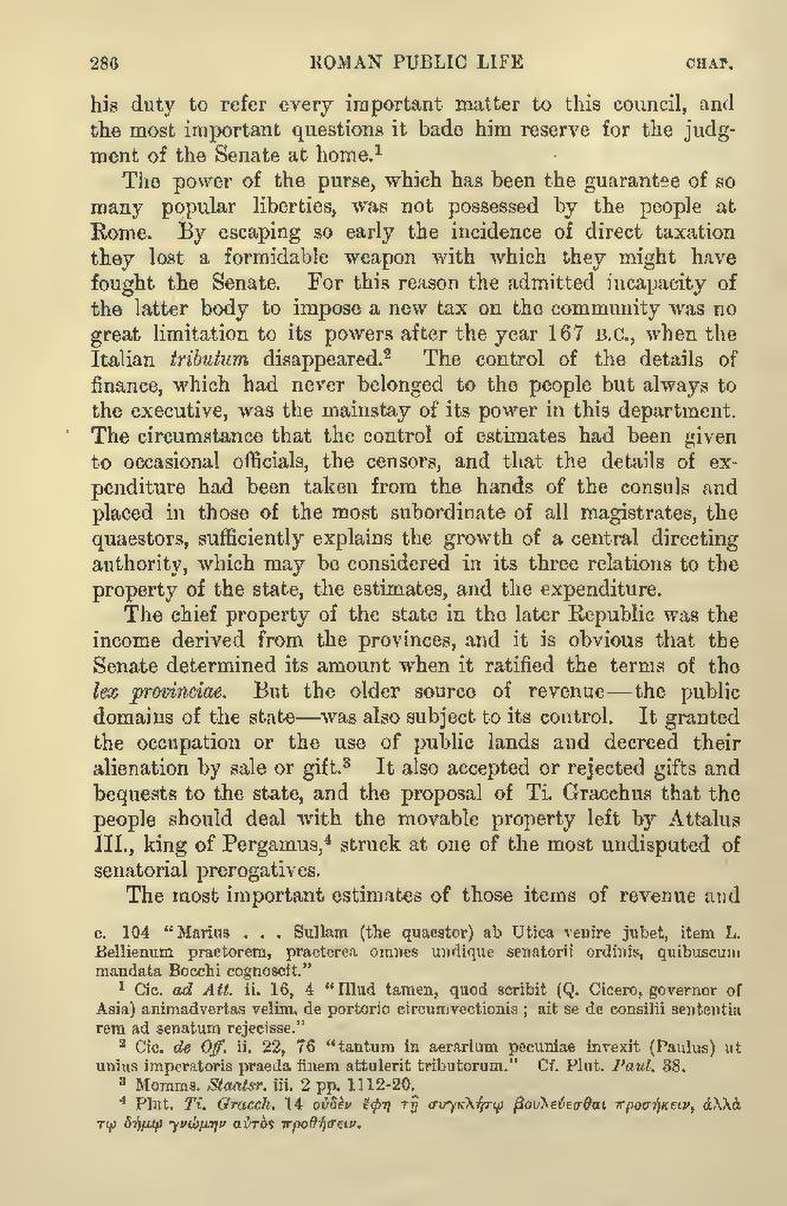his duty to refer every important matter to this council, and the most important questions it bade him reserve for the judgment of the Senate at home.[1]
The power of the purse, which has been the guarantee of so many popular liberties, was not possessed by the people at Rome. By escaping so early the incidence of direct taxation they lost a formidable weapon with which they might have fought the Senate. For this reason the admitted incapacity of the latter body to impose a new tax on the community was no great limitation to its powers after the year 167 B.C., when the Italian tributum disappeared.[2] The control of the details of finance, which had never belonged to the people but always to the executive, was the mainstay of its power in this department. The circumstance that the control of estimates had been given to occasional officials, the censors, and that the details of expenditure had been taken from the hands of the consuls and placed in those of the most subordinate of all magistrates, the quaestors, sufficiently explains the growth of a central directing authority, which may be considered in its three relations to the property of the state, the estimates, and the expenditure.
The chief property of the state in the later Republic was the income derived from the provinces, and it is obvious that the Senate determined its amount when it ratified the terms of the lex provinciae. But the older source of revenue—the public domains of the state—was also subject to its control. It granted the occupation or the use of public lands and decreed their alienation by sale or gift.[3] It also accepted or rejected gifts and bequests to the state, and the proposal of Ti. Gracchus that the people should deal with the movable property left by Attalus III., king of Pergamus,[4] struck at one of the most undisputed of senatorial prerogatives.
The most important estimates of those items of revenue and
- [Footnote: c. 104 "Marius . . . Sullam (the quaestor) ab Utica venire jubet, item L.
Bellienum praetorem, praeterea omnes undique senatorii ordinis, quibuscum mandata Bocchi cognoscit."].]
- ↑ Cic. ad Att. ii. 16, 4 "Illud tamen, quod scribit (Q. Cicero, governor of Asia) animadvertas velim, de portorio circumvectionis; ait se de consilii sententia rem ad senatum rejecisse."
- ↑ Cic. de Off. ii. 22, 76 "tantum in aerarium pecuniae invexit (Paulus) ut unius imperatoris praeda finem attulerit tributorum." Cf. Plut. Paul. 38.
- ↑ Momms. Staatsr. iii. 2 pp. 1112-20.
- ↑ Plut. Ti. Gracch. 14 [Greek: ouden ephê tê synklêtô bouleuesthai prosêkein, alla tô dêmô gnômên autos prothêsein
